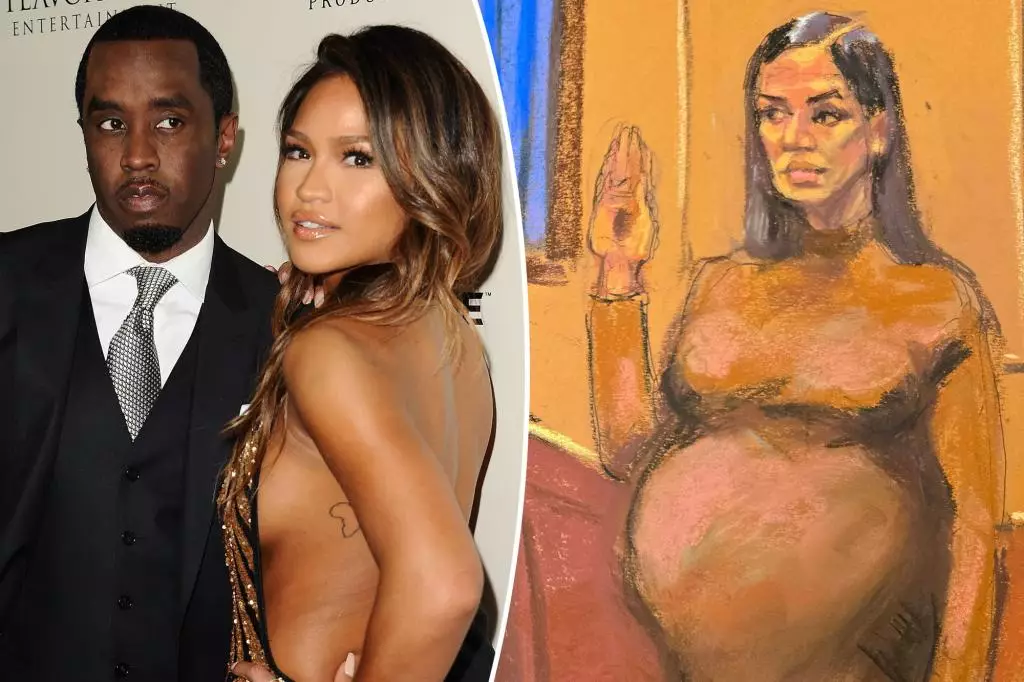In a sensational courtroom revelation, model and singer Cassie Ventura provided harrowing accounts of her tumultuous relationship with music mogul Sean “Diddy” Combs. Her testimony during his sex trafficking trial unveiled a troubling world filled with exploitation and violence, deeply shaking the perception of a celebrity figure who, until now, has largely evaded public scrutiny regarding personal misconduct. Ventura’s allegations paint a disturbing picture of a decade-long relationship characterized by manipulation, psychological trauma, and physical abuse.
Cassie’s testimony, which describes “Freak-Offs” as illicit events that were ostensibly fun but turned into obligatory tasks under Diddy’s coercion, is particularly striking. She conveyed how these parties consumed her life, suggesting that they were less about pleasure and more about appeasing Diddy’s whims. This accusation opens a dialogue about consent and the blurred lines that can exist in relationships where one partner holds significantly more power and influence. It raises an urgent question: How do we view relationships between public figures and their partners when the dynamics involve such extremes of manipulation and control?
The Illusion of Love Crumbling
The emotional toll of her relationship with Diddy becomes glaringly apparent as Ventura recounts the physical violence inflicted upon her. The details she shared—of being beaten and verbally assaulted—underline a toxic environment that contradicts the glamorous facade projected by celebrity culture. Ventura’s claim that her abuser would resort to extreme violence over minor disputes resonates deeply, as it reveals the tragic interplay of love and fear.
“When you’re in a relationship, love is often seen as the ultimate weapon for forgiveness; however, I wonder how love can coexist with fear and oppression,” Cassie reflects. Her narrative serves to amplify a critical conversation on how narratives of abuse are often minimized within the entertainment industry—a sector that typically promotes glamorous and idyllic stories. Ventura shines a light on the reality many individuals face behind closed doors, challenging the romanticized interpretations of relationships that often flood our screens.
The Legal Battle and Its Implications
Ventura’s recent lawsuit against Diddy, filed in November 2023, underscores broader issues within the legal landscape concerning sexual violence. Her claims of rape and sustained abuse throughout her ten-year relationship challenge us to confront the disturbing number of prominent individuals who’ve skirted past accountability. The fact that Diddy quickly settled the lawsuit for an undisclosed amount less than 24 hours after it was filed evokes questions about justice and the power dynamics inherent in celebrity culture. Are financial settlements merely a means to silence victims rather than address the systematic problems of abuse?
Furthermore, the release of hotel surveillance footage depicting Diddy’s violent behavior adds a chilling dimension to the ongoing trial. It offers tangible proof of his alleged brutality, fostering a sense of urgency for women and men alike to come forward with similar experiences. With the Los Angeles Police Department officer’s testimony about Diddy trying to bribe him into silence, the case invites scrutiny into the latent protection mechanisms that exist for celebrities, highlighting the imbalance between the accused and the victims’ quest for justice.
Cultural Reflection and Accountability
Ventura’s courageous act of stepping into the courtroom to testify not only seeks justice for herself but also symbolizes a larger movement for accountability within an industry often resistant to change. As she recounted her experiences, she transformed personal pain into a collective rallying cry, challenging societal norms that have historically silenced victims. The broader implications of her testimony extend well beyond her relationship with Diddy; they reflect the pervasive culture of silence that has historically shrouded abuse in the entertainment industry.
Moreover, the charges Diddy now faces for racketeering conspiracy and sex trafficking echo with layers of complexity and a sense of urgency. They highlight how crucial it is to dismantle the facade that often surrounds powerful figures. We must continue to critically analyze the standards to which we hold public figures and assess how the stories of victims like Cassie Ventura shape the narrative of consent, power, and abuse in society today.
In the end, the bravery exhibited by Cassie Ventura in bringing her story to light is remarkable not just as a personal journey but as a significant cultural milestone that urges society to rethink its priorities and biases regarding power dynamics in relationships. Rather than turning a blind eye, it’s crucial to engage in meaningful dialogues that push for change and advocate for the protection of individuals facing abuse, reinforcing that stories like Cassie’s matter profoundly.

